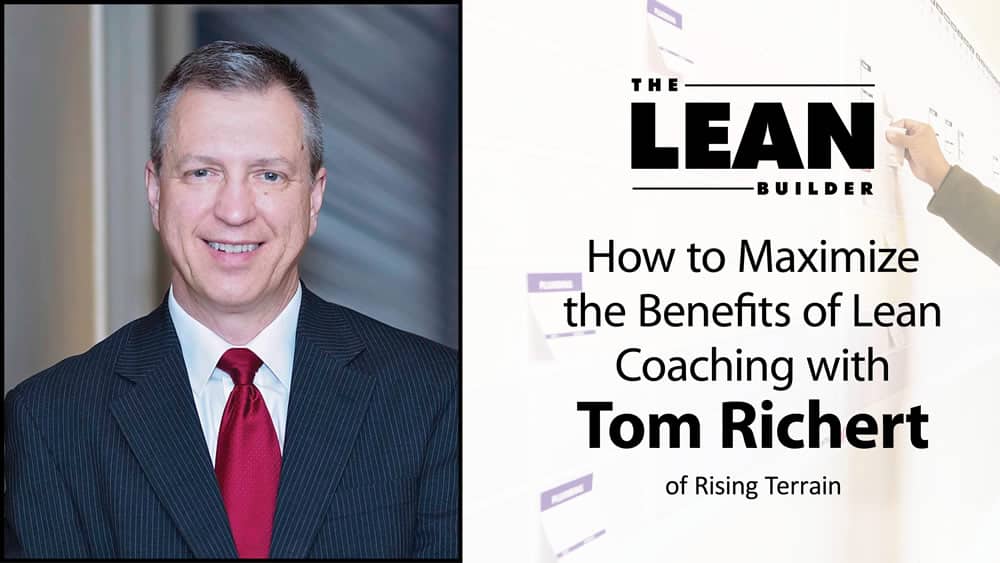Learn how to maximize the many benefits of Lean Coaching in this Q&A with Tom Richert of Rising Terrain hosted by Katie Van Adzin, a construction technology expert.
Lean Coaching Q&A with Tom Richert of Rising Terrain
Katie Van Adzin: I know coaching is key to a successful Lean implementation, both to getting teams up and running and on an ongoing basis to keep them on a path of continuous improvement. Is there a certain frequency or format of coaching that you particularly recommend?
Tom Richert: For coaching a project team, the frequency and intensity depends on their skills proficiency. So, if they’re just learning Last Planner®, they benefit from almost daily coaching for two or three weeks. This intensive focus supports their understanding and consistent use of the Lean practices. Then we back off the coaching to a level appropriate to the team and the project. Once a month or once every six weeks for a very capable team can still be very helpful.
One of the best teams I coached, I was observing their weekly meeting every other week well into their second year building the project. They had the best weekly meetings I’d seen, and yet they still sought my perspective on how they could improve. And it really tested me as a coach, because they were by that time running excellent meetings. The superintendent was always asking what they could do that’s even better. And there is always something. That’s the mindset you must have, and they were open to understanding what my perspective was.
That’s where a coach can bring in fresh ideas, or say, “I saw this on this particular project, it might be something you want to try.” When you start coaching a project, and the team is just starting to understand Lean, you’re more prescriptive. You do, at times, say things like, “do this, don’t do this.”
As the team matures and you step back, the coaching conversation shifts to things like, “I noticed this is happening. Here are a couple things I’ve seen that may successfully address that.” You’re also trying to get them to think of additional ways they might address that challenge to make that improvement. There are many areas where improvements will help. It could be how they hold meetings. It could be how they organize materials or tools. It could be how they manage material flow. There are a lot of different areas in which you coach, and it is more consultative as a team matures.
I would say even the best teams can benefit from a coach being on the ground at some frequency to give them feedback on what they’re doing. It’s no different than a professional sports coach. Someone with an objective look at your performance can be a valuable guide. It’s hard to do that if you’re the player that’s in the midst of the action.
Katie Van Adzin: The team that you mentioned, that was having the really productive weekly meetings, what about their meetings set them apart?
Tom Richert: They rotated the ownership of the meeting. Most meetings, the superintendent would normally handle introductions, but then one of the trade foremen would then chair the weekly coordination portion of the meeting. That speaks to creating a weekly planning session that the entire team owns. It’s not the superintendent saying, “This is how we want to run the project.”
Project work is a collaboration. That’s one of the things that always stood out for me. They had a very clear agenda of how much time they wanted to spend on each topic in the meeting. The agenda was posted on the wall and they had a countdown clock to track how they were doing with respect to their time budget. They always ended on time.
And despite having a 75-minute meeting, by agreement, it felt like the quickest 75 minutes I had ever spent in a meeting. Every moment had a purpose, and everyone was engaged throughout. Each week they asked a different trade to talk about some innovation, some improvement that they’re making to some aspect of their work. Sometimes it might’ve been things they’re doing in the field. Other times, it might’ve been things they were doing in the shop. There was this continuous focus on improvement despite already performing at a very high level.
About Tom Richert
Tom Richert is principal of Rising Terrain, a coaching practice that equips enterprise and project teams to magnify their impact through higher levels of performance. He is a team culture workshop provider for national conferences organized by the Lean Enterprise Institute, the Lean Construction Institute, and Lean Frontiers. Tom’s work with Lean principles began in 2000 when he led the implementation of them on two New England building projects, resulting in his designing and delivering company-wide Lean training workshops. The experiences and insights from his 2017 workshop with leading Lean practitioners and a group of artists are documented in his book, Lean Conversations: The Energy of the Creative Ethos in Your Life and Work, with a foreword by John Shook.
He is a regular contributor to the Lean Enterprise Institute Lean Post, the co-author of papers addressing Lean topics published by the American Association of Civil Engineers and the International Group for Lean Construction, and has lectured to graduate classes at the University of California Berkeley, Loyola University New Orleans, the University of Massachusetts Amherst, and the Wentworth Institute of Technology in Boston. He is a Lean Summit workshop facilitator, a member of the Lean Construction Institute (LCI), and has presented work at past LCI annual conferences.









